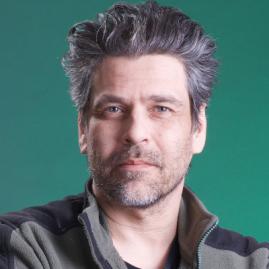
Sean Cutler is a plant biologist recognized for his work on the hormone abscisic acid (ABA), which is a stress-activated signaling molecule that helps plants cope with drought stress. Dr. Cutler was born in Canada and graduated from the University of Toronto with degrees in anthropology (B.A.) and botany (M.S.), and from Stanford University in biological sciences (Ph.D.). After brief postdoctoral studies at the Scripps Research Institute, Dr. Cutler became an Assistant Professor at the University of Toronto and subsequently moved to UCR in 2006. He is currently a Distinguished Professor of Plant Cell Biology in the Department of Botany and Plant Sciences, a Fellow of the American Association for the Advancement of Science (2017), and a member of the National Academy of Sciences (2018). He has won multiple awards for his research including the American Society of Plant Biologists' Charles Albert Shull Award (2011) for outstanding contributions to plant biology.
Dr. Cutler's research focuses on understanding and manipulating plant responses to drought. His laboratory uses a combination of chemical, biochemical, and genetic approaches to dissect the mechanism of action of ABA, a central regulator of plant stress responses. When Dr. Cutler started his laboratory, a long-standing and unresolved question was: how is ABA perceived? Previous attempts to answer this question using mutational analyses had turned up empty-handed. We now know, due to Dr. Cutler's work and that of others, that this is because multiple receptors perceive ABA. As a result, removing any single receptor is not sufficient to disrupt signaling on its own, which hampered genetic analyses. Dr. Cutler's laboratory took a chemical approach to the problem and identified a synthetic ABA mimic called pyrabactin, which selectively activates a subset of ABA responses. His group then used pyrabactin as a form of biochemical "bait" and used it to identify the first ABA receptor. This pivotal discovery has opened the door to both chemical and genetic improvement of crop tolerance to drought. His lab has since developed synthetic ABA mimics to serve as next-generation agrochemical tools for mitigating the effects of drought stress on agriculture. More recently, his laboratory has used synthetic biology approaches to reprogram plants so that traits of interest, such as drought tolerance or flowering can be controlled at will with environmentally benign chemicals.
